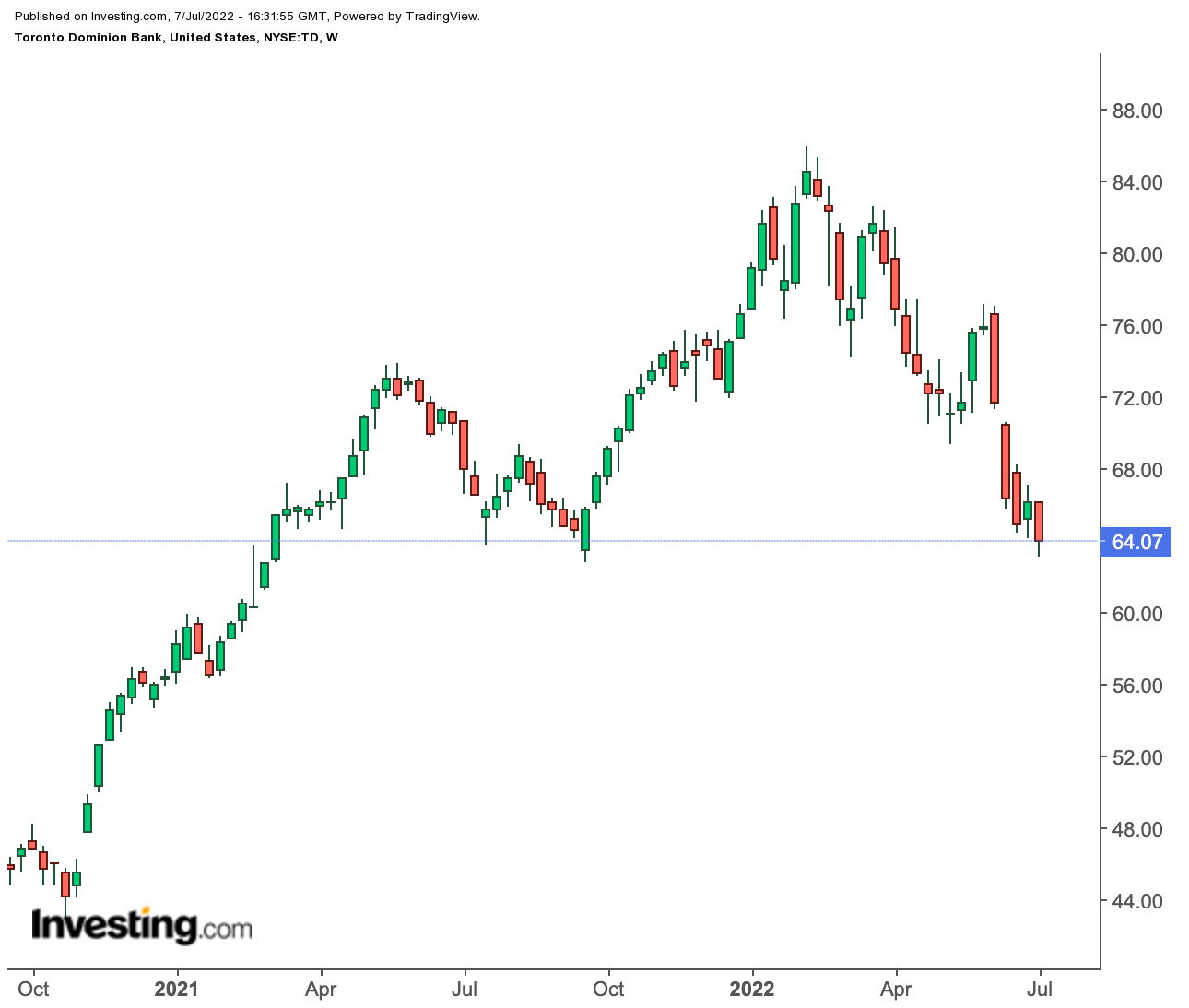Gold scales new record high; nears $4,200/oz on Fed easing bets, trade tensions
- This year's market rout is forcing investors to seek refuge in stocks that pay steady dividends
- Defensive stocks are most likely to withstand any fallout from rising interest rates and persistently high inflation
- Canadian banks are among the safest dividend-paying stocks in North America
- If you’re interested in upgrading your search for new investing ideas, check out InvestingPro+
The current market turmoil indicates that the era of making easy money through fast-growing stocks could be long gone. The S&P 500 just finished its worst first-half performance in 50 years after posting a nearly 20% drop, while the NASDAQ, which mainly represents high-growth technology stocks, is down almost 30% from its all-time high in January.
Markets are now progressively returning to the fundamentals of investing, rewarding companies that pay reliable returns in the shape of steady dividends.
Such stocks are more likely to withstand any fallout from rising interest rates and persistently high inflation—a toxic combination pushing the economy to the edge of a prolonged recession.
Against this macroeconomic backdrop, it makes sense to include some of these companies in your portfolio—particularly the ones with the most consistent track record of dividend growth. Below are three such stocks:
1. Toronto-Dominion Bank
When picking dividend-paying stocks for your recession-proof portfolio, the biggest concern is whether the company can produce strong cash flows in both good and bad times. The Toronto-based lender, Toronto Dominion Bank (NYSE:TD), certainly fits that bill.
Canadian banks are among the safest dividend-paying stocks in North America. What makes them different from peers south of the border is less competition, a sound regulatory environment, and diversification.
They operate in a kind of oligopoly where competition is limited. Canada’s top lenders have consistently rewarded investors through steadily growing dividends, on which they spend about 40%-50% of their income.
TD Bank, Canada’s largest by market value, has a very attractive dividend policy, supported by strong growth momentum, and a significant banking operation in the US, where it has more retail branches than in Canada, with a network that stretches from Maine to Florida.
This position has further strengthened this year after TD announced to buy First Horizon Corp. (NYSE:FHN) for $13.4 billion to expand its presence in the Southeast USA. The deal would make Toronto-Dominion’s US franchise into one of the nation’s top six banks, with about $614 billion in assets.
With a close to 4.35% annual dividend yield, TD pays $0.695 a share quarterly dividend, which, on average, has grown more than 8% per year during the past five years.
2. Johnson & Johnson
Johnson & Johnson (NYSE:JNJ) is an old-economy stock that rarely gets space in the financial press due to its investment appeal. But the New Brunswick, N.J.-based healthcare giant is precisely the investment risk-averse investors should consider holding over the long run.
JNJ is one of the world’s most powerful brands that offer products that remain necessary even during a recession. Plus, economic swings don’t typically curb the roll-out of new drugs and medical devices.
When it comes to rewarding investors, few companies have done better than JNJ. The company has increased its quarterly dividend for 60 consecutive years. This remarkable performance puts Johnson & Johnson among an elite group known as Dividend Kings, companies with at least five decades of annual dividend hikes.
Johnson & Johnson currently offers a dividend yield of around 2.54%, which is significantly above the market average. The S&P 500 is at the moment offering a dividend yield of about 1.37%.
Furthermore, the US drug giant is financing the payment of a quarterly dividend of $1.13 per common share with a solid balance sheet. As of April 2, 2022, the company had $30.4 billion in cash and short-term securities against total debt of $33.2 billion.
3. IBM
In the current environment, investors have little appetite to buy technology stocks, as their fate usually goes hand-and-hand with the interest-rate direction. However, International Business Machines (NYSE:IBM) is a tech stock that doesn’t fall into that category. 
IBM is a safe dividend stock due to its low debt and payout ratios. A payout ratio refers to the proportion of earnings a company pays its shareholders in dividends.
In a recent note to clients, Evercore ISI said that 111-year-old IBM is one of the best-positioned IT stocks amid a broad market downturn. Its note said:
“We think a high degree of revenue visibility, customer/end-market diversity, strong balance sheet, less cyclical risk and/or secular growth drivers should help insulate [IBM from macro headwinds].”
Evercore also noted that, when looking at past performance during recessions, IBM, in particular, had successfully managed to protect its margins.
Furthermore, IBM’s recent earning reports showed that the Armonk, New York-based tech giant, is succeeding in its turnaround strategy to transition to a business fueled by cloud-based software and consulting.
IBM, which traditionally relied on infrastructure and information-technology services, posted its most significant sales increase in a decade, helped by more sales of its cloud-based offerings.
IBM stock currently pays a quarterly dividend of $1.65 per share dividend, which translates into a roughly 4.8% annual dividend yield at the current stock price. The company also has a solid track record of rewarding investors by hiking its dividend for the last 27 years.
Disclosure: The writer currently owns shares of Toronto-Dominion Bank.
***
Looking to get up to speed on your next idea? With InvestingPro+ you can find
- Any company’s financials for the last 10 years
- Financial health scores for profitability, growth, and more
- A fair value calculated from dozens of financial models
- Quick comparison to the company’s peers
- Fundamental and performance charts
And a lot more. Get all the key data fast so you can make an informed decision, with InvestingPro+. Learn More »
